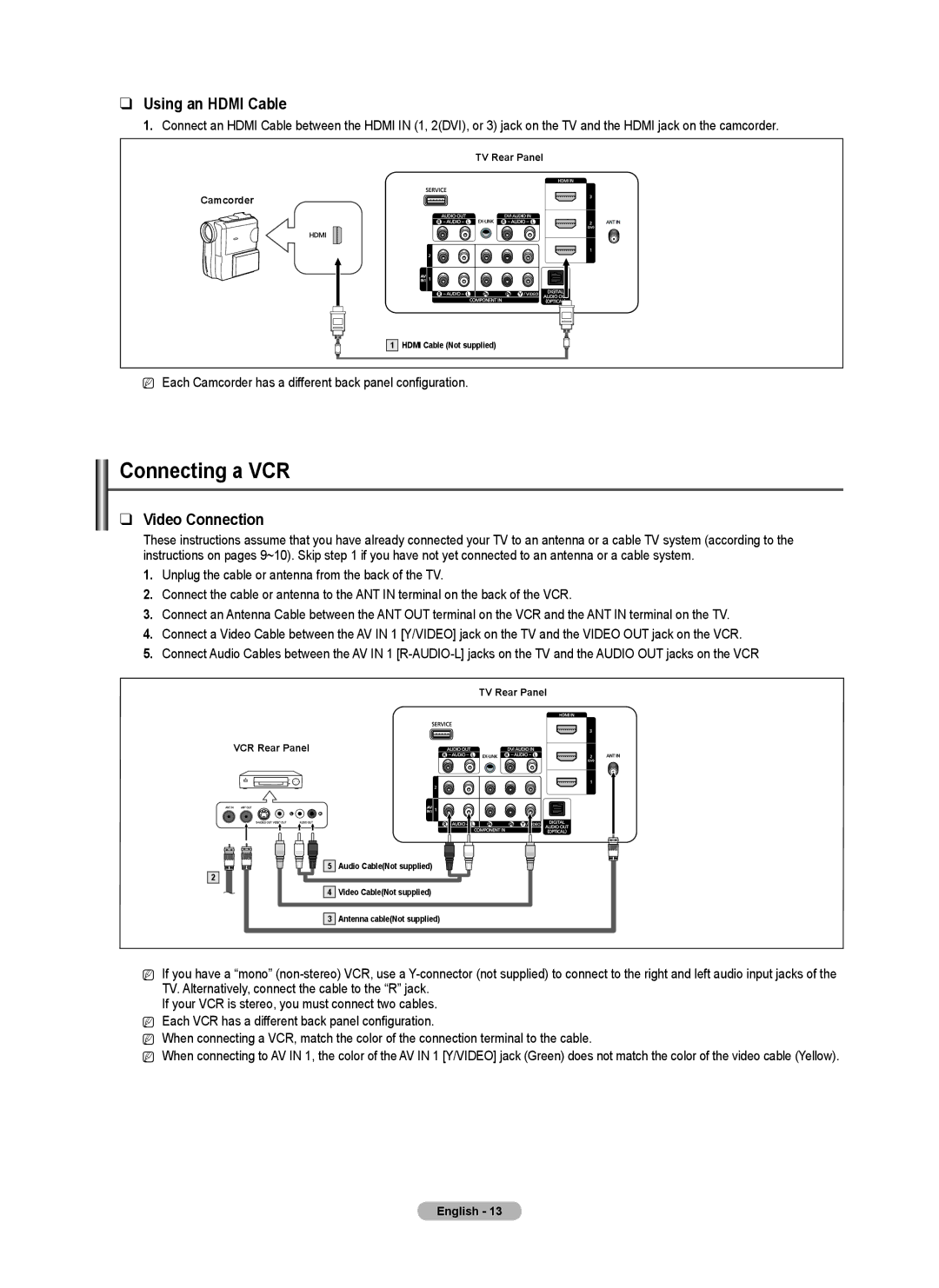Ridgefield Park, NJ
Web Site Address
Standish Court Mississauga, Ontario L5R 4B2 Canada
Standish Court Mississauga, Ontario L5R 4B2
Other countries
A Only
User Instructions
Contents
List of Features
Connecting and Preparing Your TV
Checking Parts
Assembling the Cables
Aim the remote control towards this spot on the TV
Press to see an on-screen menu of your TV’s features
Viewing the Control Panel
+ VOL
Hdmi in 1, 2DVI
Viewing the Connection Panel
Installing Batteries in the Remote Control
Remote Control
Connecting Cable TV
Connecting VHF and UHF Antennas
Connections
ANT
Connecting to a Cable Box that Descrambles Some Channels
Hdmi Cable Not supplied
Using a Video / Audio Cable
Connecting a Camcorder
Using an Hdmi Cable
Connecting a VCR
Each Camcorder has a different back panel configuration
Video Connection
Connecting an Amplifier / DVD Home Theater
Connecting a Digital Audio System
Using an HDMI/DVI Cable
Connecting a PC
Operation
Adjusting the Volume
Turning the TV On and Off
Changing Channels
Viewing the Display
Using the Tools Button
13-1
Adjusting the Brightness to
Example Setting the TV’s Brightness in the Picture Menu
Viewing the Menus
Application, Support
If you want to reset this feature
Plug & Play Feature
Displayed
Message Select the Antenna source to memorize. is displayed
Storing Channels
Channel Control
Managing Channels
Channel List Tools Menu in Programmed
Advanced Settings
Changing the Picture Settings
Picture Control
Mode
Picture Options
Hdmi Black Level
Film Mode
Screen Burn Protection
Press any key on the remote control to cancel this feature
Picture Reset → Reset Picture Mode / Cancel
Resets all picture settings to the default values
Picture Reset
Sound Control
Changing the Sound Settings
Sound Reset
Configuring the Setup Menu
Game Mode is not available in regular TV mode
Function Description
Chip
Caption On-Screen Text Messages
Caption Mode Default, CC1~CC4, Text1~Text4 Digital
Change PIN
Analog
Energy Saving
Melody
Melody
Time
Setting the Time
Source List / Edit Name
Using the Color buttons on the remote with the Source list
Source List
Edit Name
PC Display
Using Your TV as a Computer PC Display
Display Modes
Support
Signal Strength Digital
Self Diagnosis
Picture Test
Software upgrade
Software Upgrade
HD Connection Guide
Contact Samsung
Anynet+
Connecting Anynet+ Devices
To connect to a Home Theater
Connect only one Home Theater
Scanning and Switching between Anynet+ Devices
Setting Up Anynet+
Listening through a Receiver Home theater
Recording
Troubleshooting for Anynet+
Appendix
Troubleshooting
How to attach the Stand-Base
Preparation before installing the Wall-Mount
Using the Stand-Base
Securing the TV to the Wall
Accessaries
To prevent the TV from falling
Wall
Product Family Inch Vesa Spec. a * B Standard Screw Quantity
Wall Mount Kit Specifications Vesa
Specifications
Jack Panel Detail 7.2 x 3.7 inches
Dimensions PN50B530S2F
Dimensions PN58B530S2F
Téléviseur à écran à plasma
Autres pays
États-Unis seulement
Aux États-Unis 1-800-SAMSUNG
Mode d’emploi
Table des matières
Symbole
Branchement d’un lecteur DVD/Blu-Ray, d’un câblosélecteur
Appuyer Remarque Touche à effleurement
Liste des caractéristiques
Branchement et préparation de votre téléviseur
Vérification des pièces
Assemblage des câbles
Et de la télécommande
Présentation du panneau de commande
Pointez la télécommande vers ce capteur sur le téléviseur
TV, AV, Composante1, Composante2, HDMI1, HDMI2/DVI, HDMI3
Connecteur pour entretien seulement
Présentation du panneau de branchement
Brancher à une composante audionumérique
Ce connecteur ne sert qu’aux réparations
Insertion des piles dans la télécommande
Télécommande
Branchement des antennes VHF et UHF
Branchements
Branchement à la câblodiffusion
Câble d’ Entrée Répartiteur
Câble Hdmi non compris
’aide d’un câble vidéo/audio
Branchement d’un caméscope
Branchement d’un magnétoscope
La configuration arrière de chaque caméscope varie
’aide d’un câble Hdmi
Branchement vidéo
Branchement d’un système audionumérique
’aide d’un câble HDMI/DVI
Branchement d’un ordinateur
Fonction
Réglage du volume
Mise sous tension et hors tension du téléviseur
Changement de canal
Visualisation de l’affichage
La touche Tools
Appuyez sur la touche TOOLS. Le menu Outils s’affiche
Touche Fonctions
Visualisation des menus
Le message Mémoriser une source d’antenne
Fonction Prêt à l’emploi
Si vous souhaitez réinitialiser ce paramètre
Enregistrement des canaux
Commande des canaux
Gestion des canaux
Ajouter aux favoris / Supprimer des favoris
Ajouter ou Supprimer
→ Ajouter aux favoris ou Supprimer des favoris
Écoute par minuterie
Modification des paramètres de l’image
Commande de l’image
Réglages avancés
Options d’image
Réduct. bruit num
Source d’entrée Format de l’image
Nv nr Hdmi
Protection contre la brûlure d’écran
Réinitialisation de l’image
Réduction des effets de la brûlure d’écran
Modification des paramètres du son
Commande du son
Description des fonctions
Réglage du menu Configuration
Sélect. le haut-parleur
Réinitialisation du son
Cont. paren. TV
Blocage V-Chip → Off / On
Catégories de base
Sous-catégories
Sous-titres texte à l’écran
Économiseur énergie
Mélodie
Mélodie Moyen
Fuseau hor
Réglage de l’horloge
Mise en veille
Manuel
Liste source
Liste source / Entrer le nom
Entrer le nom
TV, AV, Composante1, Composante2, HDMI1, HDMI2/DVI, HDMI3
Écran d’ordinateur
Configuration du logiciel sur votre PC sous Windows XP
Utilisation de votre téléviseur comme écran d’ordinateur PC
Modes d’affichage
Puissance du signal canaux numériques
Autodiagnostic
Support technique
Essai d’image
Guide de connexion HD
Mise à jour du logiciel
Contacter Samsung
Clé USB Panneau latéral Du téléviseur
Branchement d’un cinéma maison
Branchement de dispositifs Anynet+
Maximum de 3 appareils de même type
Balayage et permutation entre les appareils Anynet+
Configuration d’Anynet+
Écoute par l’intermédiaire d’un récepteur cinéma maison
Enregistrement
Menu Anynet+
Menu Anynet+ Description
Dépannage de la fonction Anynet+
Dépannage
Annexe
Cas A. Installation du support mural Samsung
Préparation avant l’installation du support mural
Assemblage du socle
Utilisation du support
Fixation du téléviseur au mur
Accessoires
Supportdu téléviseur
Pour empêcher le renversement du téléviseur
Pouces
Spécifications pour la trousse de fixation murale Vesa
Plasma
Spécifications
VUE Latérale VUE Arrière
Détails DU Panneau DES Prises 7,2 x 3,7 Pouces
Dimensions PN58B530S2F
Cette page est laissée Intentionnellement en blanc

